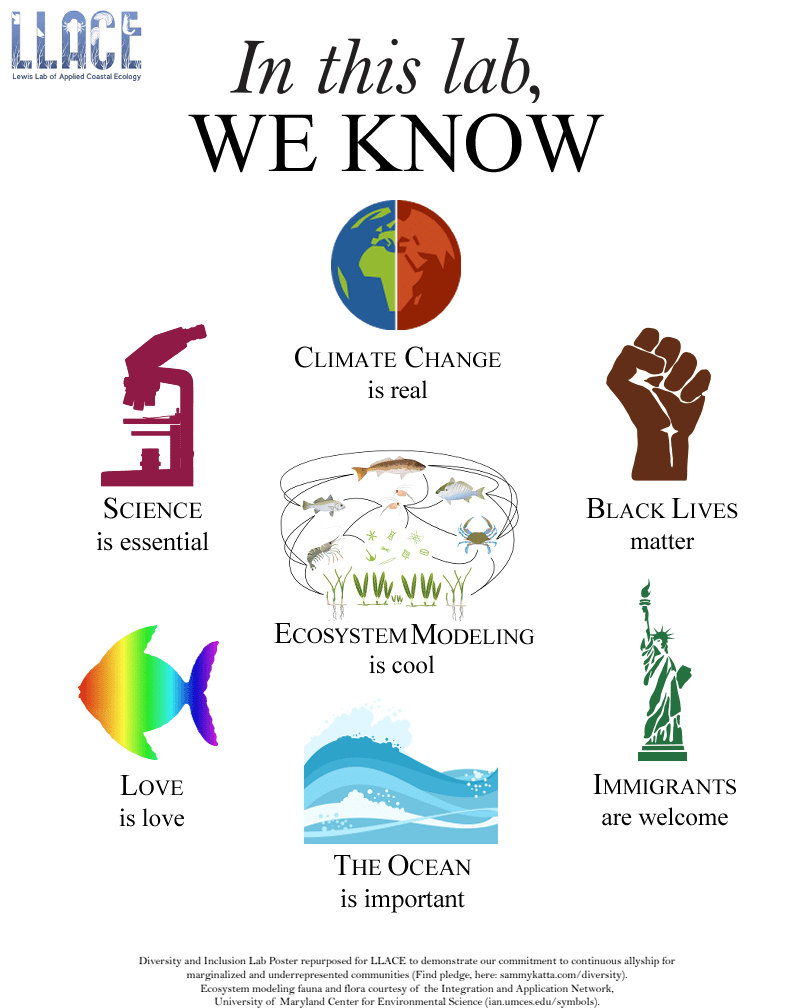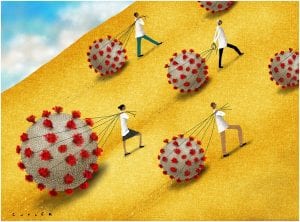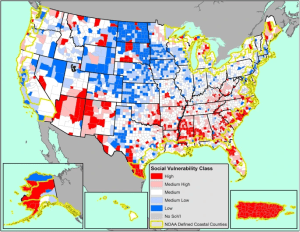
The Lewis Lab of Applied Coastal
Ecology is firmly rooted in
anti-racist frameworks and practices.
In our lab we cultivate an environment where everyone experiences belonging. We value people of any age, culture, mental or physical ability, ethnicity, first generation status, familial status, gender identity and expression, sex, geographic background, marital status, national origin, race, religious and spiritual beliefs, sexual orientation, socioeconomic status, and veteran status.
We acknowledge the current and historic oppression experienced by Black, Indigenous, and People of Color and denounce the culture of white supremacy that has benefited white people at the direct expense of peoples who are not white or not white presenting, including the people in this lab.
We understand that collaborations built on centering historically excluded perspectives are critical to advancing science and society as we experience the catastrophic impacts of climate change. Our pursuit of knowledge must be just and move beyond colonial ways of knowing.
We vow to create an environment that is anti-racist by doing the necessary work at the personal, interpersonal and structural levels in this lab. We acknowledge the realities of bias and taken for granted assumptions that uphold white supremacy (even if unintentionally). We commit to speaking out against statements that are racist and oppressive, and act in support of movements and communities seeking equality and reparations.
Below we outline our collectively developed approaches to ensuring LLACE actively pursues a culture of inclusivity and fosters a sense of belonging for all people who interact with us.
In our Lab Group
- We encourage historically underrepresented undergraduate students to seek out opportunities for research in our lab and we will serve as mentors for those that wish to pursue a career in marine and coastal ecology.
- We will foster a lab environment where members feel safer asking for help, sharing their needs and working collaboratively.
- We will recruit new lab members based on holistic evaluation, which includes lived experience as expertise.
- We will actively pursue knowledge that will interrupt discrimination and teach us how to breakdown the barriers to success faced by historically excluded groups.
- We commit to regularly discussing our norms, progress, and re-commitment to an inclusive culture. We encourage everyone to participate in shaping the lab environment and policies, and create opportunities for feedback to the PI.
In the Field
- We encourage research practices that address equity, consider the socio-ecological context of our work, and its impacts on diverse communities.
- We honor community knowledge, histories, and stories in our field sites
- We promote open and engaging field research, where all individuals may learn from one another, feel confident in participating, and understand that their concerns are valued.
In the Classroom
- We encourage students to adopt growth-mindsets; no student is “born bad at” a subject. Instead, we foster the idea that every skill can be learned and improved over time, regardless of previous ability.
- We design class activities with multiple pathways for learning and provide varied forms of assessment.
- We teach students how to collaborate, work in teams, and communicate across difference and discipline.
- We commit to consistently revisiting our teaching practices to ensure they use inclusive, trauma informed pedagogy.
In the Community
- Our lab members will regularly engage in outreach and partnership with our local community to communicate the science we are conducting.
- We will work as accomplices with historically underrepresented groups and actively amplify voices to break down antiquated systemic structures that perpetuate inequities.
LLACE recommended resources:
List of foundations seeking aid:
Black Lives Matter: https://blacklivesmatter.com/
Looking Out Foundation: https://www.lookingoutfoundation.org/
Planned Parenthood: https://www.plannedparenthood.org/get-involved/other-ways-give
List of readings we recommend:
How to be Anti-Rascist by Ibram X. Kendi
So You Want to Talk About Race by Oluo
Odekunle 2020: Dismantling systemic racism in science
List of contact information for local and regional representatives:
-
- Governor: https://www.flgov.com/contact-governor/
- House of Representatives: https://www.myfloridahouse.gov/contentViewer.aspx?Category=website&File=contact%20us.htm
- Florida Senate: https://flsenate.gov/About/Contact
LAND ACKNOWLEDGMENT
The University of Central Florida is located on the traditional unceded territory of the Ais, Apalachee, Calusa, Timucua and Tocobago tribes. These Indigenous people, many of whom lost their lives to genocide, were forced to leave their land. I recognize the historical and continuing impacts of colonization on Indigenous communities, their resilience in the face of colonial and state sponsored violence, and fully support Indigenous Sovereignty. https://native-land.ca/
Diversity and Inclusion LLACE Publications
| In the Wake of COVID-19, Academia Needs New Solutions to Ensure Gender Equity | A Socio-ecological Imperative for Broadening Participation in Coastal and Estuarine Research and Management |
 |
 |
| “A pandemic naturally highlights privileges, such as financial security and access to mental health care. It also amplifies the mental, physical, social, and economic impacts attributable to preexisting inequities in academia. Making matters worse, in times of stress, such as pandemics, biased decision-making processes are favored, which threaten to deprioritize equity initiatives.” | “For most of the scientific disciplines associated with coastal and estuarine research, workforce representation does not match the demographics of communities we serve, especially for Black, Hispanic or Latino, and Indigenous peoples. This essay provides an overview of this inequity and identifies how a scientific society can catalyze representational, structural, and interactional diversity to achieve greater inclusion.” |
